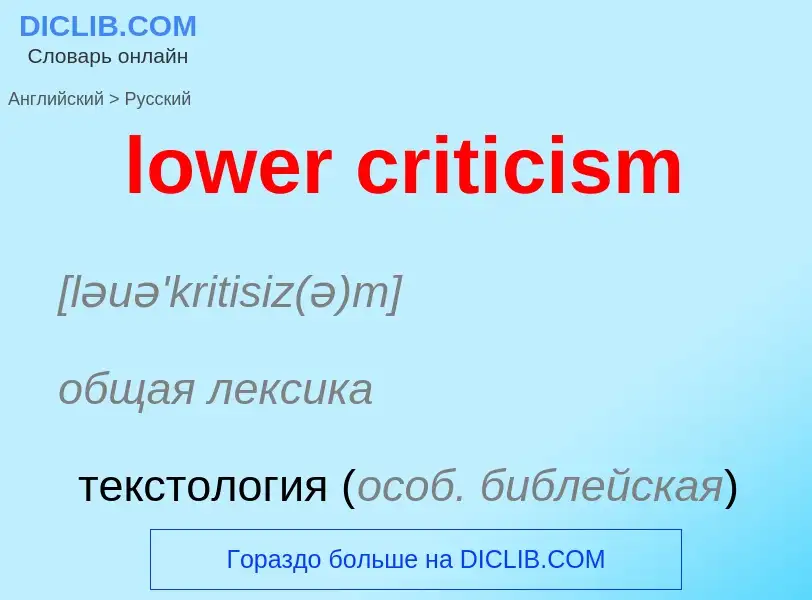Μετάφραση και ανάλυση λέξεων από την τεχνητή νοημοσύνη ChatGPT
Σε αυτήν τη σελίδα μπορείτε να λάβετε μια λεπτομερή ανάλυση μιας λέξης ή μιας φράσης, η οποία δημιουργήθηκε χρησιμοποιώντας το ChatGPT, την καλύτερη τεχνολογία τεχνητής νοημοσύνης μέχρι σήμερα:
- πώς χρησιμοποιείται η λέξη
- συχνότητα χρήσης
- χρησιμοποιείται πιο συχνά στον προφορικό ή γραπτό λόγο
- επιλογές μετάφρασης λέξεων
- παραδείγματα χρήσης (πολλές φράσεις με μετάφραση)
- ετυμολογία
lower criticism - translation to ρωσικά
[ləuə'kritisiz(ə)m]
общая лексика
текстология (особ. библейская)
общая лексика
объективные показания или данные
Ορισμός
Βικιπαίδεια

Textual criticism is a branch of textual scholarship, philology, and of literary criticism that is concerned with the identification of textual variants, or different versions, of either manuscripts (mss) or of printed books. Such texts may range in dates from the earliest writing in cuneiform, impressed on clay, for example, to multiple unpublished versions of a 21st-century author's work. Historically, scribes who were paid to copy documents may have been literate, but many were simply copyists, mimicking the shapes of letters without necessarily understanding what they meant. This means that unintentional alterations were common when copying manuscripts by hand. Intentional alterations may have been made as well, for example, the censoring of printed work for political, religious or cultural reasons.
The objective of the textual critic's work is to provide a better understanding of the creation and historical transmission of the text and its variants. This understanding may lead to the production of a critical edition containing a scholarly curated text. If a scholar has several versions of a manuscript but no known original, then established methods of textual criticism can be used to seek to reconstruct the original text as closely as possible. The same methods can be used to reconstruct intermediate versions, or recensions, of a document's transcription history, depending on the number and quality of the text available.
On the other hand, the one original text that a scholar theorizes to exist is referred to as the urtext (in the context of Biblical studies), archetype or autograph; however, there is not necessarily a single original text for every group of texts. For example, if a story was spread by oral tradition, and then later written down by different people in different locations, the versions can vary greatly.
There are many approaches or methods to the practice of textual criticism, notably eclecticism, stemmatics, and copy-text editing. Quantitative techniques are also used to determine the relationships between witnesses to a text, with methods from evolutionary biology (phylogenetics) appearing to be effective on a range of traditions.
In some domains, such as religious and classical text editing, the phrase "lower criticism" refers to textual criticism and "higher criticism" to the endeavor to establish the authorship, date, and place of composition of the original text.


![marginal note]] between columns one and two) criticizing a predecessor for changing the text: "Fool and knave, leave the old reading, don't change it!"<ref name="MisJ">Ehrman 2005, p. 44.[https://books.google.com/books?id=99chXHGSVH0C&pg=PA44]{{cbignore}}. See also [https://books.google.com/books?id=99chXHGSVH0C&pg=PA56]{{cbignore}}.</ref> marginal note]] between columns one and two) criticizing a predecessor for changing the text: "Fool and knave, leave the old reading, don't change it!"<ref name="MisJ">Ehrman 2005, p. 44.[https://books.google.com/books?id=99chXHGSVH0C&pg=PA44]{{cbignore}}. See also [https://books.google.com/books?id=99chXHGSVH0C&pg=PA56]{{cbignore}}.</ref>](https://commons.wikimedia.org/wiki/Special:FilePath/Codex Vaticanus B, 2Thess. 3,11-18, Hebr. 1,1-2,2.jpg?width=200)
![Scheme of descent of the manuscripts of [[Pseudo-Apuleius Herbarius]] by [[Henry E. Sigerist]] (1927) Scheme of descent of the manuscripts of [[Pseudo-Apuleius Herbarius]] by [[Henry E. Sigerist]] (1927)](https://commons.wikimedia.org/wiki/Special:FilePath/Howald-sigerist.png?width=200)
